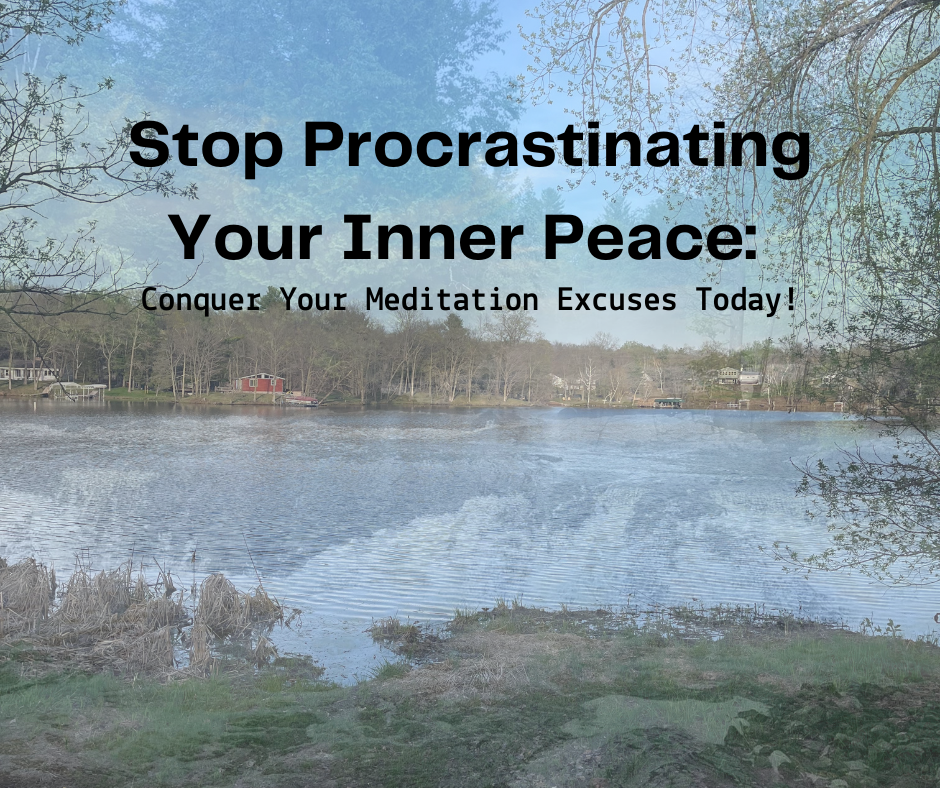Stop Procrastinating Your Inner Peace: Conquer Your Meditation Excuses Today!

In a fast-paced world where distractions are aplenty, finding inner peace through meditation is more crucial than ever.
But how many times have you found yourself making excuses to avoid sitting down and calming your mind? I am here to tell you that it's time to stop procrastinating your inner peace and conquer those meditation excuses today!
Overcoming Common Excuses for Not Meditating
Do you find yourself constantly putting off meditation, even though you know it could bring you inner peace and clarity? It's time to stop procrastinating and start prioritizing your mental well-being. Let's address some common excuses that may be holding you back from reaping the benefits of regular meditation.
Excuse #1: I don't have time to meditate.
This is perhaps the most common excuse people use to avoid meditation. However, consider this: just 10 minutes of meditation a day can make a significant difference in your mental clarity and overall well-being. You don't need hours of free time to meditate. Set your alarm a few minutes earlier in the morning or take a short meditation break during your lunch hour. Find small pockets of time in your day to dedicate to self-care through meditation.
Excuse #2: I can't quiet my mind enough to meditate.
It's a misconception that meditation requires complete silence or a perfectly clear mind. In reality, meditation is about observing your thoughts without judgment and gently guiding your focus back to your breath or a mantra. Your mind may wander during meditation, and that's completely normal. The key is to acknowledge the thoughts and then return to your point of focus. With practice, you will find it easier to quiet your mind and enter a state of calmness.
Excuse #3: I don't know how to meditate.
Meditation doesn't have to be complicated. There are countless resources available to guide you through different meditation techniques, from guided meditations to simple breathing exercises. Start with just a few minutes of focused breathing and gradually increase the duration as you become more comfortable with the practice. Remember, there is no right or wrong way to meditate—find what works best for you and stick with it.
Benefits of Regular Meditation Practice
Now that we've addressed some common excuses for not meditating, let's focus on the numerous benefits that regular meditation practice can bring into your life. By committing to a consistent meditation routine, you can experience positive changes in various aspects of your well-being.
Benefit #1: Reduced stress and anxiety
One of the most well-known benefits of meditation is its ability to reduce stress and anxiety levels. By practicing mindfulness and deep breathing techniques, you can bring your mind into the present moment and alleviate feelings of overwhelm and tension. Regular meditation can help you cultivate a sense of calmness and resilience in the face of life's challenges.
Benefit #2: Improved focus and clarity
Meditation has been shown to enhance cognitive function and improve focus and concentration. By training your mind to stay present and centered, you can increase your ability to stay focused on tasks and make better decisions. The mental clarity gained through meditation can also help you see situations from a broader perspective and approach challenges with a clearer mind.
Benefit #3: Enhanced emotional well-being
Regular meditation practice can have a profound impact on your emotional well-being. By tuning into your thoughts and emotions during meditation, you can develop a greater sense of self-awareness and emotional regulation. This can lead to improved relationships, increased empathy, and a greater sense of connection with yourself and others.
Tips for Making Meditation a Habit
Now that you understand the importance of prioritizing your mental well-being through meditation, let's explore some practical tips for making meditation a consistent habit in your daily routine. By implementing these strategies, you can overcome procrastination and establish a sustainable meditation practice.
Tip #1: Set realistic goals
Start small and build gradually. Rather than aiming for long meditation sessions right from the beginning, set achievable goals such as meditating for 5-10 minutes each day. Consistency is key when forming a new habit, so focus on making meditation a daily ritual that you look forward to.
Tip #2: Create a dedicated space
Designate a quiet and peaceful area in your home where you can meditate without distractions. Whether it's a cozy corner with a cushion or a serene outdoor spot, having a designated meditation space can help signal to your brain that it's time to unwind and focus inward.
Tip #3: Find a meditation buddy or community
Joining a meditation group or finding a meditation buddy can provide accountability and support as you establish your practice. Sharing your meditation journey with others can also offer valuable insights and motivation to stay committed to your self-care routine.
Say goodbye to excuses and hello to the transformative power of meditation. Start today, and watch as your life blossoms with joy, clarity, and serenity.
Incorporate these tips into your daily life and watch as your inner peace and mental clarity grow with each meditation session. It's time to conquer your excuses and prioritize your well-being through the transformative power of meditation.